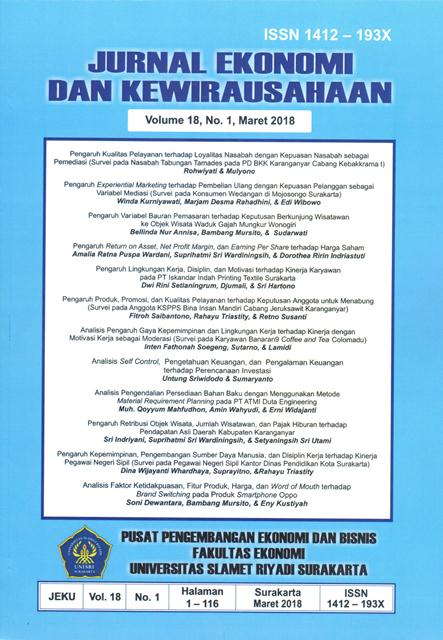ANALISIS SELF CONTROL, PENGETAHUAN KEUANGAN, DAN PENGALAMAN KEUANGAN TERHADAP PERENCANAAN INVESTASI
Abstract
Investment planning is an act of allocating a number of funds currently made inthe hope of obtaining future income. Investment planning is an important thing that is
owned by people who have a fixed income so that the income derived from the results of
their work can be useful for their future. The population in this study were permanent
income people in Jaten Village, Karanganyar Regency. The sampling technique uses
porous sampling and snowball sampling, a sample used by 100 people. Data collection
techniques using: questionnaire. Data analysis using classical assumption test, multiple
linear regression, t test, F test, and determination coefficient. The results obtained by the
conclusion: Hypothesis 1 which states that: There is a significant effect of self-control on
investment planning in the fixed income community in Jaten village, Karanganyar
Regency, proven to be true. Hypothesis 2: which states that: There is a significant
influence of financial knowledge on investment planning in fixed income communities in
Jaten village, Karanganyar Regency, proven to be true. Hypothesis 3 states that: There
is a significant effect of financial experience on investment planning in the fixed income
community in Jaten village, Karanganyar Regency, proven to be true.
Keywords: self control, financial knowledge, financial experience, investment planning.
Downloads
Published
2018-11-27
Issue
Section
Artikel
License
Authors who publish this journal agree to the following terms:
- Authors retain copyright and grant the journal right of first publication with the work simultaneously licensed under a Creative Commons Attribution License that allows others to share the work with an acknowledgement of the work's authorship and initial publication in this journal.
- Authors can separately make additional contractual arrangements for non-exclusive distribution published by the journal (e.g., publish it in a book), with an acknowledgement of its initial publication in this journal.
- Authors are allowed and encouraged to send their work via online (e.g., in the institutional repositories or their website) after published by the journal.









